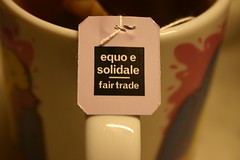 Image by flydown via Flickr
Image by flydown via FlickrMarch 08, 2011 @ 08:37 AM
I remember sitting in a small room in Mumbai, India, listening to a woman who led a business close to the red light district that employed women who had come out of commercial sex work. She spoke of how hard it was to change the course of the lives of women with which she worked. Some had come voluntarily out of the brothel to find a different life, to be trained in a skill in making products that were sold internationally. She spoke with an obvious sense of deep sadness of how difficult it was to pour months of care and training into a woman that she took in to the business only to see them for different reasons slip back into the life from which they came. Her focus was on creating enough work to keep the women fully employed. As she shared her greatest need – that of ensuring enough orders to sustain the momentum of their business and keep the women fully employed – this good woman could not mask her personal sense of guilt of not being able to provide for her women the opportunity they needed to keep them away from the grip of their old life.
Her husband worked with law enforcement to expose the trafficking of young girls into brothels and spoke of the very palpable sense of evil and danger that he confronted daily. The whole experience for me was an epiphany, although I did not recognize it as such at the time. The good that this couple were attempting to do in an atmosphere of bondage and abuse was a challenge to my sense of significance in life. Not just whether my life had enough meaning when compared to what they were doing, but I had to ask myself if I had the courage to do something as brave as them and risk looking back on years of labor to ask how much I had really achieved? I did not know it at the time, but those two days I spent with them would alter the course of my future.
I find myself seven years later running a business that exists to create enough work for businesses like that one I visited. Here is how I see Trade as One‘s mission is an important part of a response to slavery:
1. After all the hard and dangerous work of releasing someone from the grips of slavery, if they do not have a dignified source of income that pays a living wage, they can be just as vulnerable as they ever were.
2. The reason why people are trafficked and enslaved in the first place is because they are poor. This poverty deprives them of financial stability and of the protection of the rule of law. It is a noble act to rescue people from drowning in a river. After seeing so many – 27 million slaves alive today – one has to ask the question of why they are falling into the river further upstream. Providing dignified work to the poor allows them to stay well away from its dangerous banks. It stops them from running out of options and migrating or being sold to the urban slums or brothels.
3. Fair Trade is using the market, not charity, to include the marginalized. As awareness and participation in it grows, it becomes an increasingly powerful message to larger corporations that there are a lot of people who are stating with their wallets that the way in which people are treated when they are making the products we buy is a very important issue. This could be the most influential role Fair Trade has in the long term. By proving that a large and viable market exists for ethically sourced products we will be able to change the way the rest of business is done.
4. We need practical, every day actions that we can engage in. Writing a check to a charity that works in this area is great and we need to do more of it. Phoning your senator, yes but once you have taken three minutes and done that, then what? Hosting a film that raises awareness, for sure. We need lots of ways to respond. Fair Trade is a way to decide, on a daily basis if you want, to take small actions that create paths out of slavery. Eating white rice from the Surin co-operative in Thailand in one of the poorest regions of that country keeps communities together and stops them from having to abandon their rural homes and migrate to the city. If everyone made small purchases the collective effect on the ability of organizations like the one I spent time with in Mumbai would be very large indeed.
Trade as One - Blog - Fair Trade as a Response to SlaverySource: radeasone.com


No comments:
Post a Comment